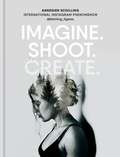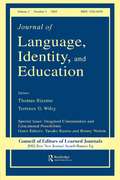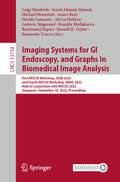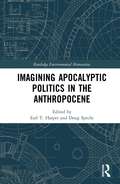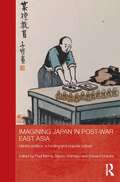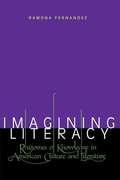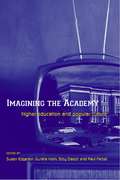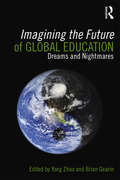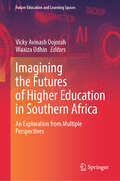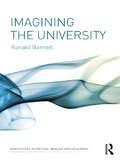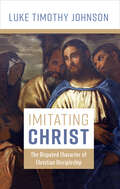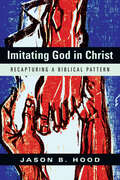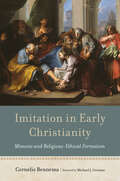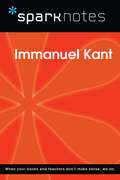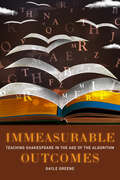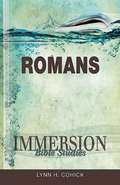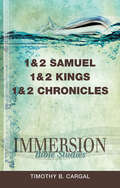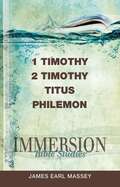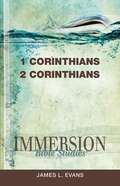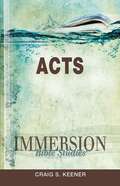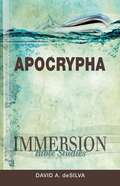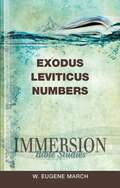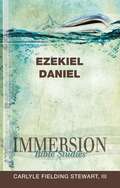- Table View
- List View
Imagine That! Stories Grade 2: Visualizing And Verbalizing
by Nanci BellThe mysterious, the unusual, the unexplained... Imagery is the medium through which language that describes our diverse world is revealed in all its detail and complexity. The Imagine That! series provides nonfiction stories with which to practice building imagery for oral and written language comprehension. These challenging, high-imagery stories introduce true and unusual topics for students to visualize, including natural disasters, legends, unique animals, odd plants, mysteries, fascinating phenomena, and people of great achievement. Each story is presented in language appropriate to the grade level, and the content is sure to capture the interest of students and instructors alike.
Imagine. Shoot. Create.: Creative Photography
by Annegien SchillingAnnegien Schilling started her @fetching_tigerss Instagram account when she was 13 years old. Six years later, she has almost 1 million followers worldwide. Her distinctive, surreal images inspire curiosity about the creative process, and in this book, Annegien shares her signature editing style in great detail. She guides her readers through simple step-by-steps to beautiful, surreal imagery and teaches her successful method of conceiving an idea (Imagine), capturing it correctly (Shoot), and editing them efficiently (Create), all without expensive camera gear or complicated software. This book will inspire you to explore your imagination and create photos you never thought possible!
Imagine. Shoot. Create.: Creative Photography
by Annegien SchillingAnnegien Schilling's imaginative self-portraits inspire just under 1 million followers under the account @fetching_tigerss. In this, her first book, she guides her readers through simple step-by-steps to beautiful, surreal imagery and teaches her successful method of conceiving an idea (Imagine), capturing it correctly (Shoot), and editing them efficiently (Create), all without expensive camera gear or complicated software. This book will inspire you to explore your imagination and create photos you never thought possible!
Imagined Communities and Educational Possibilities: A Special Issue of the journal of Language, Identity, and Education
by Thomas Ricento Terrence G. WileyImagined Communities and Educational Possibilities focuses on three main themes: imaged communities expand the range of possible selves, technological advances in the last two decades have had a significant impact on what is possible to imagine, and imagination at even the most personal level is related to social ideologies and hegemonies. The diverse studies in this issue demonstrate convincingly that learners and teachers are capable of imagining the world as different from prevailing realities. Moreover, time and energy can be invested to strive for the realization of alternative visions of the future. Research in this special issue suggests that investment in such imagined communities offers intriguing possibilities for social and educational change.
Imaging Systems for GI Endoscopy, and Graphs in Biomedical Image Analysis: First MICCAI Workshop, ISGIE 2022, and Fourth MICCAI Workshop, GRAIL 2022, Held in Conjunction with MICCAI 2022, Singapore, September 18, 2022, Proceedings (Lecture Notes in Computer Science #13754)
by Emanuele Trucco Bartlomiej Papiez Davide Lomanto Russell H. Taylor Luigi Manfredi Seyed-Ahmad Ahmadi Michael Bronstein Anees Kazi Alwyn Mathew Ludovic Magerand Kamilia MullakaevaThis book constitutes the refereed proceedings of the first MICCAI Workshop, ISGIE 2022, Imaging Systems for GI Endoscopy, and the Fourth MICCAI Workshop, GRAIL 2022, GRaphs in biomedicAL Image and analysis, held in conjunction with MICCAI 2022, Singapore, September 18, 2022.ISGIE 2022 accepted 6 papers from the 8 submissions received.This workshop focuses on novel scientific contributions to vision systems, imaging algorithms as well as the autonomous system for endorobot for GI endoscopy. This includes lesion and lumen detection, as well as 3D reconstruction of the GI tract and hand-eye coordination. GRAIL 2022 accepted 6 papers from the 10 submissions received. The workshop aims to bring together scientists that use and develop graph-based models for the analysis of biomedical images and to encourage the exploration of graph-based models for difficult clinical problems within a variety of biomedical imaging contexts.
Imagining Apocalyptic Politics in the Anthropocene (Routledge Environmental Humanities)
by Earl T. HarperBringing together scholars from English literature, geography, politics, the arts, environmental humanities and sociology, Imagining Apocalyptic Politics in the Anthropocene contributes to the emerging debate between bodies of thought first incepted by scholars such as Mouffe, Whyte, Kaplan, Hunt, Swyngedouw and Malm about how apocalyptic events, narratives and imaginaries interact with societal and individual agency historically and in the current political moment. Exploring their own empirical and philosophical contexts, the authors examine the forms of political acting found in apocalyptic imaginaries and reflect on what this means for contemporary society. By framing their arguments around either pre-apocalyptic, peri-apocalyptic or post-apocalyptic narratives and events, a timeline emerges throughout the volume which shows the different opportunities for political agency the anthropocenic subject can enact at the various stages of apocalyptic moments. Featuring a number of creative interventions exclusively produced for the work from artists and fiction writers who engage with the themes of apocalypse, decline, catastrophe and disaster, this innovative book will be of great interest to students and scholars of the politics of climate change, the environmental humanities, literary criticism and eco-criticism.
Imagining Japan in Post-war East Asia: Identity Politics, Schooling and Popular Culture (Routledge Studies in Education and Society in Asia)
by Paul Morris Edward Vickers Naoko ShimazuIn the decades since her defeat in the Second World War, Japan has continued to loom large in the national imagination of many of her East Asian neighbours. While for many, Japan still conjures up images of rampant military brutality, at different times and in different communities, alternative images of the Japanese ‘Other’ have vied for predominance – in ways that remain poorly understood, not least within Japan itself. Imagining Japan in Postwar East Asia analyses the portrayal of Japan in the societies of East and Southeast Asia, and asks how and why this has changed in recent decades, and what these changing images of Japan reveal about the ways in which these societies construct their own identities. It examines the role played by an imagined ‘Japan’ in the construction of national selves across the East Asian region, as mediated through a broad range of media ranging from school curricula and textbooks to film, television, literature and comics. Commencing with an extensive thematic and comparative overview chapter, the volume also includes contributions focusing specifically on Chinese societies (the mainland PRC, Hong Kong and Taiwan), Korea, the Philippines, Malaysia and Singapore. These studies show how changes in the representation of Japan have been related to political, social and cultural shifts within the societies of East Asia – and in particular to the ways in which these societies have imagined or constructed their own identities. Bringing together contributors working in the fields of education, anthropology, history, sociology, political science and media studies, this interdisciplinary volume will be of interest to all students and scholars concerned with issues of identity, politics and culture in the societies of East Asia, and to those seeking a deeper understanding of Japan’s fraught relations with its regional neighbours.
Imagining Literacy: Rhizomes of Knowledge in American Culture and Literature
by Ramona FernandezDefining the "common knowledge" a "literate" person should possess has provoked intense debate ever since the publication of E. D. Hirsch's controversial book Cultural Literacy: What Every American Needs to Know. Yet the basic concept of "common knowledge," Ramona Fernandez argues, is a Eurocentric model ill-suited to a society composed of many distinct cultures and many local knowledges.<P><P>In this book, Fernandez decodes the ideological assumptions that underlie prevailing models of cultural literacy as she offers new ways of imagining and modeling mixed cultural and non-print literacies. In particular, she challenges the biases inherent in the "encyclopedias" of knowledge promulgated by E. D. Hirsch and others, by Disney World's EPCOT Center, and by the Smithsonian Institution. In contrast to these, she places the writings of Zora Neale Hurston, Maxine Hong Kingston, Gloria Anzaldúa, and Leslie Marmon Silko, whose works model a cultural literacy that weaves connections across many local knowledges and many ways of knowing.
Imagining the Academy: Higher Education and Popular Culture
by Gunilla Holm Paul Farber Susan Edgerton Toby DaspitThe essays in this book examine various forms of popular culture and the ways in which they represent, shape, and are constrained by notions about and issues within higher education. From an exploration of rap music to an analysis of how the academy presents and markets itself on the World Wide Web, the essays focus attention on higher education issues that are bound up in the workings and effects of popular culture.
Imagining the Future of Global Education: Dreams and Nightmares
by Yong Zhao Brian GearinImagining the Future of Global Education examines the Grand Educational Narrative (GEN) and the major institutions that shape and disseminate it. The book focuses on national visions of education and the imaginary futures that nations seek to make reality. It critiques how the GEN policy implementation process frequently turns dreams of upward mobility into nightmares. In this way, the book takes a distinctly different approach than most comparative and international education studies. Rather than being oriented toward the past and asking how education systems around the world ended up where they are, chapters in this volume seek an understanding of how various educational visions from around the world inform the present and shape the future. Following an introductory summary of important concepts from scholarship on "imaginary futures" and global education reform, the book is organized around three themes: "What Dreams are Made Of," illustrating, through three case studies, what the GEN looks like at the national level and how it operates across national boundaries; "A Dream within a Dream," considering some of the more novel trends in international education reform in order to provide insight into how dreams seem to function; and "Keeping Dreams from becoming Nightmares," comprising three thematic essays that describe trends in education policy in one or more countries. The book concludes with lessons for scholars and policymakers.
Imagining the Futures of Higher Education in Southern Africa: An Exploration from Multiple Perspectives (Future Education and Learning Spaces)
by Waaiza Udhin Vicky Avinash OojorahThis book showcases multiple perspectives about the futures of Higher Education from experts and other stakeholders in academia in the Southern African region, with each chapter presenting a different scenario of a possible future for Higher Education. It situates itself at the confluence of various fields of study such as Educational Technologies, Artificial Intelligence (AI), Sociology of Education, Sociology of the Future, Sustainable Development and Climate Change. It also includes various topics, such as digital development in terms of AI and emerging technologies, Higher Educational strategising and planning, the philosophical underpinnings of Higher Education and the present-day need for Sustainable Development models. Through the various chapters discussing the above-mentioned themes in the varied contexts of the Southern African region, this book helps readers engage in imaginative thinking regarding the future world and thus be prepared to embrace the challenges ahead. This book also underpins curriculum development for the new era firstly through new philosophical outlooks and secondly through ideas for novel learning areas in Higher Education and content to help shape minds for the twenty-first century. This book paves the way for innovation, progress and adaptation to the changing needs of the Higher Education clientele. It also attempts to influence policymaking, support advocates for sustainability and environmental education, prepare for technological advancements and improve the resilience and wellbeing of people in the region.
Imagining the University (New Studies in Critical Realism and Education (Routledge Critical Realism))
by Ronald BarnettAround the world, what it is to be a university is a matter of much debate. The range of ideas of the university in public circulation is, however, exceedingly narrow and is dominated by the idea of the entrepreneurial university. As a consequence, the debate is hopelessly impoverished. Lurking in the literature, there is a broad and even imaginative array of ideas of the university, but those ideas are seldom heard. We need, consequently, not just more ideas of the university but better ideas. Imagining the University forensically examines this situation, critically interrogating many of the current ideas of the university. Imagining the University argues for imaginative ideas that are critical, sensitive to the deep structures underlying universities and are yet optimistic, in short feasible utopias of the university. The case is pressed for one such idea, that of the ecological university. The book concludes by offering a vision of the imagining university, a university that has the capacity continually to re-imagine itself.
Imitating Christ: The Disputed Character of Christian Discipleship
by Luke Timothy JohnsonIs discipleship about personal sanctification or social reform? Believers are divided on a question central to Christian identity: what does it mean to follow Jesus? For centuries, imitating Christ meant the pursuit of holiness, conforming the self to Jesus through self-sacrifice in order to join him in eternal life. But some Christians today consider this model to be self-centered. Instead, they say, true disciples ought to imitate Jesus in confronting corrupt social systems on behalf of the oppressed. In Imitating Christ,esteemed New Testament scholar Luke Timothy Johnson seeks the origin of this fissure. Surveying the New Testament, medieval mysticism, modern theology, and more, Johnson shows how twentieth-century social-gospel and liberation theologies created a new model of discipleship. He then evaluates the theological implications of the two models and asks what we can learn from each. Inspired by Dietrich Bonhoeffer and Thomas Merton, Johnson puts forward a vision of discipleship that can revitalize Christian witness in the world today. Replete with keen exegesis and spiritual insight, Imitating Christ reorients Christian living toward pursuing sainthood. Pastors and interested lay readers alike will rediscover a rich heritage in these pages.
Imitation in Early Christianity: Mimesis and Religious-Ethical Formation
by Cornelis BennemaWhat did exhortations to &“follow Jesus&” or &“imitate Christ&” mean to early Christians? Cornelis Bennema examines mimesis as a religious-ethical concept in early Christianity—the imitation of Jesus (and other exemplars) to become a better, more Christlike person. Situating appeals for imitation in the New Testament and Apostolic Fathers within the cultural and social context of the broader Greco-Roman world, Bennema shows how early Christian mimesis was not about literal replication, but instead was a creative, cognitive, and transformative means for shaping conduct and character. As part of this study, Bennema explores key questions about the historic origins of early Christian mimesis; the language that early Christian authors used to articulate the concept of mimesis; the scope, nature, and workings of mimesis in each major section of early Christian literature; and how early Christians navigated the challenges of imitating exemplars (such as Paul or Jesus) who were not physically present. Offering well-researched answers to these questions, Bennema provides readers with a nuanced and informative picture of exhortations to imitation in the New Testament and Apostolic Fathers.
Immanuel Kant (SparkNotes Philosophy Guide)
by SparkNotesImmanuel Kant (SparkNotes Philosophy Guide) Making the reading experience fun! Created by Harvard students for students everywhere, SparkNotes is a new breed of study guide: smarter, better, faster. Geared to what today's students need to know, SparkNotes provide:Chapter-by-chapter analysis Explanations of key themes, motifs, and symbols A review quiz and essay topics Lively and accessible, these guides are perfect for late-night studying and writing papers.
Immeasurable Outcomes: Teaching Shakespeare in the Age of the Algorithm
by Gayle GreeneWhat is the purpose of education? The answer might be found in a Shakespeare class at a small liberal arts college.In this engaging account of teaching a Shakespeare class at a small liberal arts college, Gayle Greene illustrates what is so vital and urgent about the humanities. Follow along with Greene as she introduces us to her students and showcases their strengths, needs, and vulnerabilities, so we can experience the magic of her classroom. In Immeasurable Outcomes, Greene's class builds a complex human ecosystem that pushes students to think more deeply and discover their own interests and potential, all while recognizing the inherent dignity in other people's views and values. Grounding her analyses in half a century of teaching, Greene pushes back against the demand for measurable student learning outcomes and the standardization imposed on K-12 schools in the name of reform. Instead, she draws her conclusions about education directly from the students themselves. Alumni testimonials describe the transformative power of a liberal arts education, recounting how their experience of community and engagement has provided them the tools to navigate the uncertainties of a rapidly changing world while also inspiring the social awareness our democracy depends on. Immeasurable Outcomes rejects claims that the liberal arts are impractical, exposing the political agendas of technocrats and ideologues who would transform higher education into vocational training and programs focused only on profitability. Greene reminds us that the liberal arts have been the basis for the most successful educational system in the world and provides a powerful demonstration that education at a human scale that is relationship-rich and humanities-based should be the model for education in the future.
Immersion Bible Studies | Romans: Romans
by Lynn H. CohickJourney inside the pages of Scripture to meet a personal God who enters individual lives and begins a creative work from the inside out. Shaped with the individual in mind, Immersion encourages simultaneous engagement both with the Word of God and with the God of the Word to become a new creation in Christ. Immersion, inspired by a fresh translation--the Common English Bible--stands firmly on Scripture and helps readers explore the emotional, spiritual, and intellectual needs of their personal faith. More importantly, they'll be able to discover God's revelation through readings and reflections.
Immersion Bible Studies: 1 & 2 Samuel, 1 & 2 Kings, 1 & 2 Chronicles
by Dr Timothy B. CargalIt’s never been easier to grasp the depth and importance of the books of Samuel, Kings, and Chronicles than when reading them side-by-side in this Immersion Bible study. Timothy Cargal’s clear and straightforward explanations of these Scriptures along with his insightful connections to our lives today make this volume an outstanding guide in applying the lessons of these ancient books to our 21st-century faith and discipleship. Immersion, inspired by a fresh translation--the Common English Bible--stands firmly on Scripture and helps readers explore the emotional, spiritual, and intellectual needs of their personal faith. More importantly, they’ll be able to discover God’s revelation through readings and reflections.
Immersion Bible Studies: 1 & 2 Timothy, Titus, Philemon (Immersion Bible Studies)
by James Earl MasseyPastor, teacher, and mentor James Earl Massey helps us see the encouragement, wisdom, and practical direction the Epistles offer to our generation. Easy-to-follow, step-by-step suggestions for leading a group are provided, as well as questions to facilitate group discussion. Easy-to-follow, step-by-step suggestions for leading a group are provided, as well as questions to facilitate group discussion. Immersion, inspired by a fresh translation--the Common English Bible--stands firmly on Scripture and helps readers explore the emotional, spiritual, and intellectual needs of their personal faith. More importantly, they’ll be able to discover God’s revelation through readings and reflections.
Immersion Bible Studies: 1 And 2 Corinthians
by Rev James L. EvansJourney inside the pages of Scripture to meet a personal God who enters individual lives and begins a creative work from the inside out. Shaped with the individual in mind, Immersion encourages simultaneous engagement both with the Word of God and with the God of the Word to become a new creation in Christ. Immersion, inspired by a fresh translation--the Common English Bible--stands firmly on Scripture and helps readers explore the emotional, spiritual, and intellectual needs of their personal faith. More importantly, they’ll be able to discover God’s revelation through readings and reflections.
Immersion Bible Studies: Acts
by Dr Craig S. KeenerJourney inside the pages of Scripture to meet a personal God who enters individual lives and begins a creative work from the inside out. Shaped with the individual in mind, Immersion encourages simultaneous engagement both with the Word of God and with the God of the Word to become a new creation in Christ. Immersion, inspired by a fresh translation--the Common English Bible--stands firmly on Scripture and helps readers explore the emotional, spiritual, and intellectual needs of their personal faith. More importantly, they’ll be able to discover God’s revelation through readings and reflections.
Immersion Bible Studies: Apocrypha
by David A. DeSilvaJourney inside the pages of Scripture to meet a personal God who enters individual lives and begins a creative work from the inside out. Shaped with the individual in mind, Immersion encourages simultaneous engagement both with the Word of God and with the God of the Word to become a new creation in Christ Immersion, inspired by a fresh translation--the Common English Bible--stands firmly on Scripture and helps readers explore the emotional, spiritual, and intellectual needs of their personal faith. More importantly, they’ll be able to discover God’s revelation through readings and reflections.
Immersion Bible Studies: Exodus, Leviticus, Numbers (Immersion Bible Studies)
by W. Eugene MarchW. Eugene March shares the amazing journey of God’s chosen people from slavery in Egypt to the freedom before entering into the Promised Land as described in Exodus, Leviticus and Numbers. This eight-week study focuses on real life issues such as conflicts, leadership, holy living, and offerings. While these books of the Bible take a scholars approach to the story of the Israelites, Immersion Bible Studies: Exodus, Leviticus, Numbers is written in easy to understand language that explains and clarifies the Scripture and helps grow our faith. Easy-to-follow, step-by-step suggestions for leading a group are provided, as well as questions to facilitate class discussion. Immersion, inspired by a fresh translation—the Common English Bible—stands firmly on Scripture and helps readers explore the emotional, spiritual, and intellectual needs of their personal faith. More importantly, they’ll be able to discover God’s revelation through readings and reflections.
Immersion Bible Studies: Ezekiel, Daniel
by Rev Carlyle Fielding StewartJourney inside the pages of Scripture to meet a personal God who enters individual lives and begins a creative work from the inside out. Shaped with the individual in mind, Immersion encourages simultaneous engagement both with the Word of God and with the God of the Word to become a new creation in Christ Immersion, inspired by a fresh translation--the Common English Bible--stands firmly on Scripture and helps readers explore the emotional, spiritual, and intellectual needs of their personal faith. More importantly, they’ll be able to discover God’s revelation through readings and reflections.

